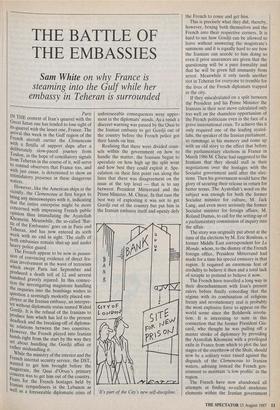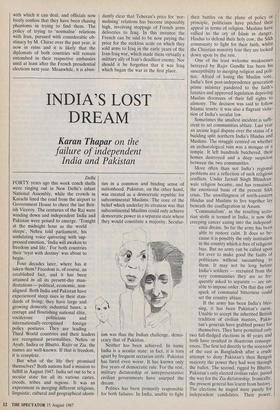THE BATTLE OF THE EMBASSIES
Sam White on why France is
steaming into the Gulf while her embassy in Teheran is surrounded
Paris IN THE context of Iran's quarrel with the Great Satan one has tended to lose sight of its quarrel with the lesser one, France. The arrival this week in the Gulf region of the French aircraft carrier the Clemenceau with a flotilla of support ships after a deliberately slow-paced journey from Toulon, in the hope of conciliatory signals from Teheran in the course of it, will serve to remind observers that France too, and with just cause, is determined to show an intimidatory presence in these dangerous
waters.
However, like the American ships in the vicinity, the Clemenceau at first forgot to bring any minesweepers with it, indicating that the entire enterprise might be more concerned with impressing French public opinion than intimidating the Ayatollah Khomeini. Meanwhile, the so-called 'Bat- tle of the Embassies' goes on in Paris and Teheran, and has now entered its sixth week with no end in sight. The staffs of both embassies remain shut-up and under heavy police guard.
The French appear to be now in posses- sion of convincing evidence of direct Ira- nian involvement in the wave of terrorism which swept Paris last September and produced a death toll of 12 and several hundred gravely injured. In this connec- tion the investigating magistrate handling the inquiries into the bombings wishes to question a seemingly modestly placed em- Ployee at the Iranian embassy, an interpre- ter without diplomatic status named Wahid Gordji. It is the refusal of the Iranians to produce him which has led to the present deadlock and the breaking-off of diploma- tic relations between the two countries. However, the French played into Iranian hands right from the start by the way they set about handling the Gordji affair or rather mishandling it. While the ministry of the interior and the French internal security service, the DST, wanted to get him brought before the magistrate, the Quai d'Orsay's primary concern was to get him out of the country. Fears for the French hostages held by Iranian sympathisers in the Lebanon as well as a foreseeable diplomatic crisis of unforeseeable consequences were upper- most in the diplomats' minds. As a result a discreet warning was passed by the Quai to the Iranian embassy to get Gordji out of the country before the French police got their hands on him.
Realising that there were divided coun- sels within the government on how to handle the matter, the Iranians began to speculate on how high up the split went and how best they could exploit it. Spe- culation on their first point ran along the lines that there was disagreement on the issue at the top level — that is to say between President Mitterrand and the Prime Minister, M. Chirac. In that case the best way of exploiting it was not to get Gordji out of the country but put him in the Iranian embassy itself and openly defy `It's part of the City's new self-discipline.' the French to come and get him.
This is precisely what they did, thereby, however, boxing both themselves and the French into their respective corners. It is hard to see how Gordji can be allowed to leave without answering the magistrate's summons and it is equally hard to see how the Iranians can accede to him doing so even if prior assurances are given that the questioning will be a pure formality and that he will be given full immunity from arrest. Meanwhile it only needs another riot in Teheran for everyone to tremble for the lives of the French diplomats trapped in the city.
If they miscalculated on a split between the President and his Prime Minister the Iranians in their next move calculated only too well on the shameless opportunism of the French politicians even in the face of a grave international crisis. To achieve this it only required one of the leading ayatol- lahs, the speaker of the Iranian parliament, to rummage in his memory and come up with an old story to the effect that before the parliamentary elections in France in March 1986 M. Chirac had suggested to the Iranians that they should stall in their negotiations over the hostages with the Socialist government until after the elec- tions. Then his government would have the glory of securing their release in return for better terms. The Ayatollah's word on the subject was enough for both the former Socialist minister for culture, M. Jack Lang, and even more seriously the former Socialist minister for foreign affairs, M. Roland Dumas, to call for the setting-up of a parliamentary commission of inquiry into the affair.
The story was originally put about at the time of the elections by M. Eric Rouleau, a former Middle East correspondent for Le Monde, whom, to the dismay of the French foreign office, President Mitterrand had made for a time his special emissary in that region. It required an enormous feat of credulity to believe it then and a total lack of scruple to pretend to believe it now.
The French have travelled a long way in their disenchantment with Iran's present rulers before finally conceding that the regime with its combination of religious frenzy and revolutionary. zeal is probably the most explosive force to appear on the world scene since the Bolshevik revolu- tion. It is interesting to note in this connection that the former President Gis- card, who thought he was pulling off a master stroke of diplomacy by providing the Ayatollah Khomeini with a privileged exile in France from which to plot the last stages of the overthrow of the Shah, should now be a solitary voice raised against the dispatch of the Clemenceau to Iranian waters, advising instead the French gov- ernment to maintain 'a low profile' in the region.
The French have now abandoned all attempts at finding so-called moderate elements within the Iranian government with which it can deal, and officials now freely confess that they have been chasing phantoms in trying to find them. The policy of trying to 'normalise' relations with Iran, pursued with considerable ob- stinacy by M. Chirac over the past year, is now in ruins and it is likely that the diplomats of both countries will remain entombed in their respective embassies until at least after the French presidential elections next year. Meanwhile, it is abun- dantly clear that Teheran's price for 'nor- malising' relations has become impossibly high, involving stoppage of French arms deliveries to Iraq. In this instance the French can be said to be now paying the price for the reckless scale on which they sold arms to Iraq in the early years of the Iran-Iraq war, which made them virtually a military ally of Iran's deadliest enemy. Nor should it be forgotten that it was Iraq which began the war in the first place.



















































 Previous page
Previous page